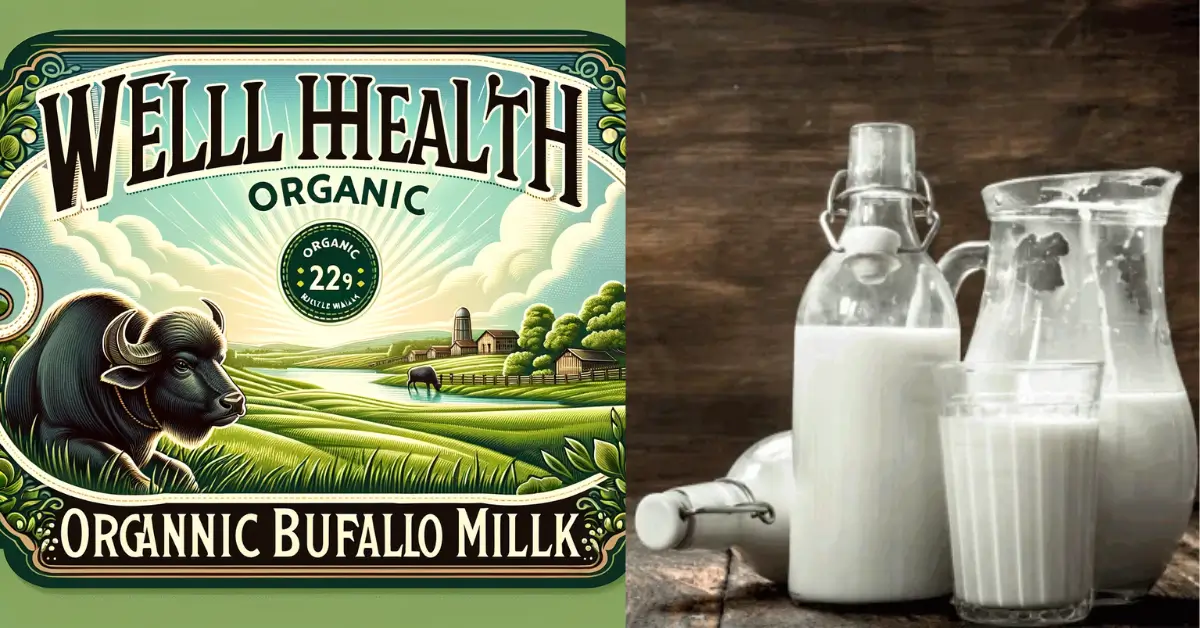WellHealthOrganic Buffalo Milk Tag: A Nutrient-Packed, Sustainable Choice, Health Benefits and Culinary Uses

The WellHealthOrganic Buffalo Milk Tag represents premium-quality buffalo milk that’s designed to offer a healthy and sustainable alternative to cow’s milk. Harvested from ethically raised buffaloes, this milk is richer in essential nutrients, including calcium, protein, and healthy fats, making it ideal for those seeking better nutrition.
What sets WellHealthOrganic buffalo milk apart is its organic certification, ensuring that no harmful chemicals or antibiotics are used during production.
This aligns with the brand’s commitment to sustainable farming, benefiting both consumers and the environment. The product offers a creamy texture, making it a perfect addition to beverages, baked goods, and more.
The Difference Between Buffalo Milk and Cow Milk
While cow’s milk is more commonly consumed, buffalo milk offers distinct advantages. It is richer in nutrients, particularly protein and fat, making it a more satiating option.
With twice the fat content of cow’s milk, buffalo milk is creamier, which enhances its flavor profile and makes it ideal for culinary uses, such as making mozzarella cheese. Another significant difference is the lactose content.
Although buffalo milk still contains lactose, some individuals with mild lactose intolerance find it easier to digest than cow’s milk. This makes buffalo milk a more suitable option for those who may struggle with the discomfort caused by regular dairy products.

Nutritional Benefits of WellHealthOrganic Buffalo Milk Tag
The nutritional value of buffalo milk is impressive, offering higher levels of calcium, vitamin A, and protein compared to cow’s milk. These nutrients are vital for bone health, muscle growth, and overall wellness.
Additionally, buffalo milk contains more fat-soluble vitamins such as vitamins A, D, E, and K, which are crucial for supporting immune function and maintaining healthy skin.
WellHealthOrganic buffalo milk is also a great source of probiotics, particularly when consumed in fermented forms like yogurt. Probiotics promote healthy digestion and can help maintain a balanced gut microbiome, further contributing to overall well-being.
Read Also: 127.0.0.1:49342
Digestive Health Advantages
One of the standout benefits of buffalo milk is its potential to aid digestion. Its high protein content, coupled with the presence of probiotics in products like buffalo yogurt, makes it an excellent option for supporting gut health.
These probiotics assist in breaking down food more efficiently and reduce symptoms of indigestion. Moreover, for those with lactose intolerance, buffalo milk presents a middle ground.
While it does contain lactose, its composition is easier for some to digest compared to cow’s milk. However, individuals with severe lactose intolerance should still approach buffalo milk with caution.
Protein and Calorie Comparison with Cow’s Milk
If you’re looking for a milk high in protein, buffalo milk surpasses cow’s milk in this regard. A single serving contains more protein, making it a popular choice for athletes, bodybuilders, and those following high-protein diets.
Protein is essential for muscle repair and growth, and buffalo milk delivers an ample supply to meet these needs. However, with higher protein and fat content also comes an increase in calories.
This is a critical consideration for those who are calorie-conscious. Although buffalo milk offers numerous health benefits, it’s essential to moderate your intake if you’re aiming to manage your calorie consumption.
Sustainability and Environmental Impact of Buffalo Milk Production
Buffalo milk production is considered more sustainable compared to cow’s milk. Buffaloes are well-adapted to tropical climates and can thrive on less intensive farming practices, making them easier to raise in regions where resources are limited.
This leads to a smaller ecological footprint, aligning with the WellHealthOrganic mission of promoting sustainable dairy options.
In addition, buffaloes require fewer veterinary interventions, meaning the milk is often produced with fewer antibiotics and growth hormones, contributing to a cleaner, healthier product. Choosing WellHealthOrganic buffalo milk helps support sustainable farming practices that benefit both the environment and consumers.

Buffalo Milk for Different Age Groups
Buffalo milk offers unique benefits for people of all ages. For children, the high calcium and protein content make it an ideal choice to support growth and strengthen bones. In fact, buffalo milk contains more calcium than cow’s milk, which is crucial for bone health during developmental years.
For adults, buffalo milk offers sustained energy and aids in muscle maintenance due to its protein and fat content. As we age, bone health becomes a greater concern, and the high calcium levels in buffalo milk help combat age-related bone density loss, making it beneficial for the elderly as well.
Buffalo Milk in Various Diets
Buffalo milk is incredibly versatile and can fit into various dietary plans. Those following a keto diet often choose buffalo milk due to its higher fat content, which helps them meet their macronutrient goals without compromising on taste. Its creamy texture also makes it a luxurious addition to smoothies and coffee.
For individuals on high-protein diets, buffalo milk provides an extra boost of protein, making it an excellent post-workout drink. However, those watching their calorie intake or managing weight should monitor their portions due to the higher caloric density of buffalo milk.
Potential Drawbacks and Considerations
While buffalo milk offers a multitude of benefits, there are some considerations to keep in mind. Its higher fat content makes it more calorically dense, so it may not be ideal for those on low-fat or calorie-restricted diets.
Additionally, individuals with severe lactose intolerance should avoid it, as it still contains lactose, which can trigger discomfort.
Moreover, buffalo milk is often more expensive than cow’s milk, largely due to the production process and availability. It’s also not as widely accessible in many regions, which may make it less convenient for everyday use.
Culinary Uses of Buffalo Milk
In the kitchen, buffalo milk’s creamy texture and rich flavor make it a go-to for creating delicious dishes. One of the most famous products made from buffalo milk is mozzarella cheese, known for its soft, chewy texture and mild taste.
Buffalo yogurt is also a popular choice, offering a thicker consistency and a more robust flavor compared to cow’s milk yogurt.
Buffalo milk is used in a variety of cuisines, from Italian dishes like Caprese salad to traditional Indian sweets. Its richness makes it perfect for baking, adding moisture and flavor to cakes, breads, and pastries.
Buffalo Milk Products: Cheese, Yogurt, and More
Beyond fresh milk, WellHealthOrganic buffalo milk is available in several other forms. Buffalo mozzarella is prized for its creamy texture and is widely used in gourmet cooking.
Buffalo butter and ghee are rich, flavorful alternatives to cow’s butter, often preferred in traditional Indian and Pakistani cooking.
Buffalo yogurt is another popular product, praised for its probiotic content and rich taste. It’s an excellent choice for those looking to incorporate more probiotics into their diet, supporting gut health and digestion.

Global Production and Consumption of Buffalo Milk
India leads the world in buffalo milk production, followed by Pakistan and China. The global demand for buffalo milk is increasing as people become more aware of its numerous health benefits and culinary versatility.
While it’s still not as widely consumed as cow’s milk in Western countries, the tide is slowly changing as more consumers look for high-protein, nutritious dairy alternatives.
The growth of WellHealthOrganic buffalo milk is a testament to this increasing demand, as more consumers seek out products that align with their health goals and values.
Read Also: Prince Narula Digital PayPal
Quick Facts
- Higher Protein and Fat: Buffalo milk contains more protein and fat than cow’s milk, making it creamier and more nutrient-dense.
- Lactose Intolerance: Some individuals with mild lactose intolerance find buffalo milk easier to digest than cow’s milk.
- Sustainability: Buffalo farming is more sustainable and environmentally friendly in certain regions, particularly tropical climates.
Final Thoughts
Choosing WellHealthOrganic buffalo milk is an excellent way to incorporate a rich, nutrient-dense dairy option into your diet. With its superior nutritional profile, sustainable production methods, and versatile culinary uses, buffalo milk is a smart choice for those looking to improve their health while also supporting environmentally conscious farming practices.
FAQs
Is buffalo milk healthier than cow’s milk?
Yes, buffalo milk is often considered more nutritious due to its higher protein, calcium, and fat content. However, it also contains more calories, so portion control is important.
Can people with lactose intolerance drink buffalo milk?
Some people with mild lactose intolerance may find buffalo milk easier to digest, but it still contains lactose, so caution is advised.
What is buffalo milk used for?
Buffalo milk is used to make a variety of dairy products, including mozzarella cheese, yogurt, butter, and ghee. It’s also popular in cooking and baking due to its creamy texture.
How does buffalo milk support bone health?
Buffalo milk contains higher levels of calcium, which is essential, making it especially beneficial for bone strength and density. The high calcium levels in buffalo milk help to reduce the risk of osteoporosis and support overall skeletal health, particularly in older adults.




